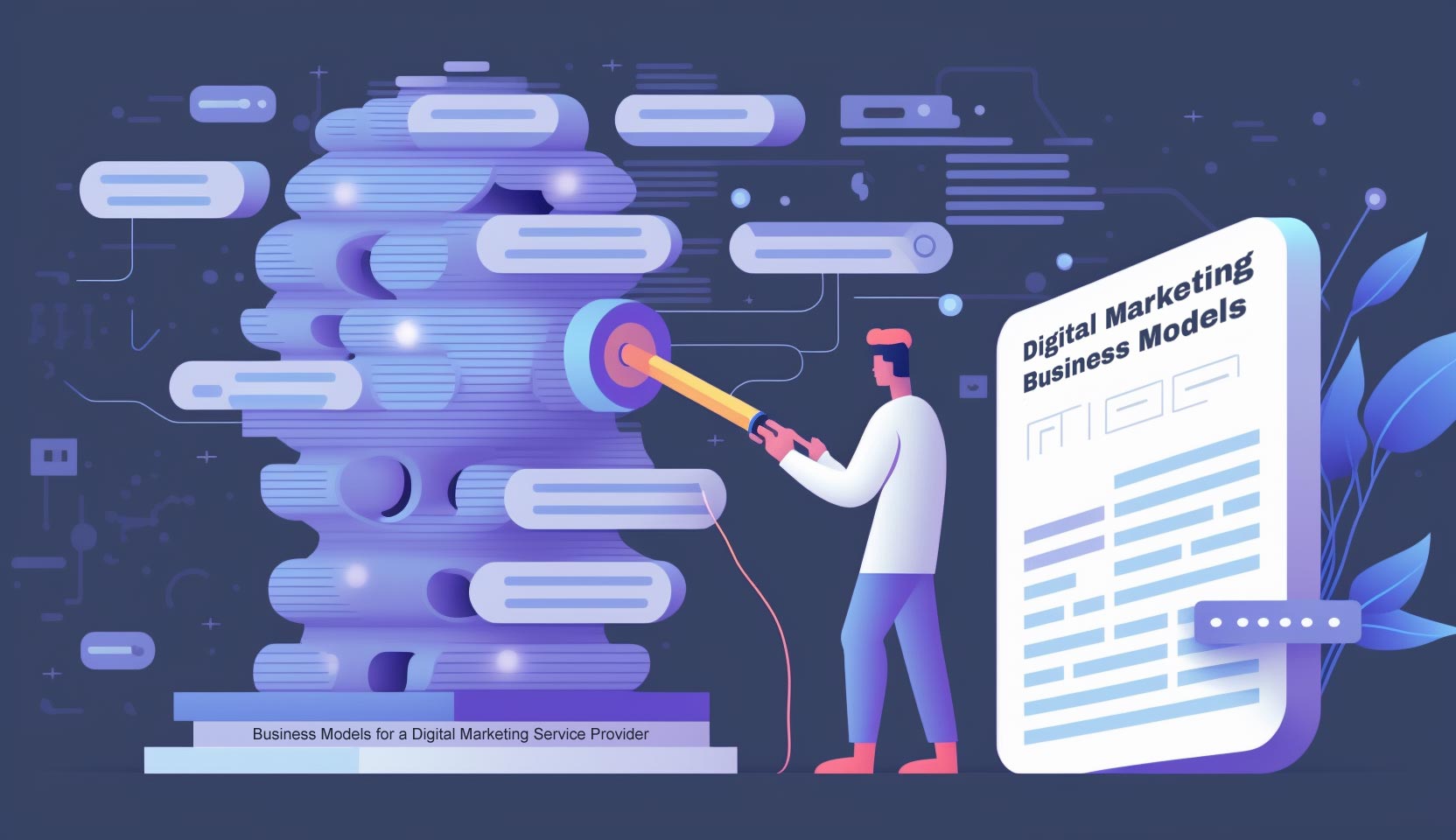The digital marketing landscape is constantly evolving, creating new opportunities for service providers to offer innovative solutions to clients. This article examines the most effective business models for digital marketing service providers.
1. Project-Based Model
1.1. Fixed-Price Projects
- Service providers offer a predetermined scope of work for a fixed price.
- Ideal for small to medium-sized projects with a clear scope.
- Examples: website design, logo creation, or marketing campaign planning.
1.2. Hourly Projects
- Service providers charge clients on an hourly basis for their work.
- Suitable for projects with variable or uncertain scope.
- Examples: ongoing SEO optimization, content creation, or social media management.
One of the most popular business models that digital marketing service providers use to cater to these requirements is the project-based model. This model focuses on delivering customized solutions to clients by working on distinct projects with a clear beginning and end.
The project-based model provides a straightforward approach for clients, as it offers a well-defined scope of work and deliverables. It allows digital marketing service providers to concentrate on particular tasks or projects, ensuring high-quality results and a targeted approach. This model is especially suitable for clients who require specialized expertise or one-time services, such as website development, logo creation, or a specific marketing campaign.
By employing the project-based model, digital marketing service providers can showcase their unique skills and knowledge, while clients can benefit from tailored solutions designed to address their specific needs. This model promotes efficiency and accountability, as it sets expectations and defines the success criteria for both parties. Furthermore, it enables service providers to manage their resources effectively and focus on multiple projects simultaneously, resulting in a diversified client portfolio and steady revenue stream.
2. Retainer-Based Model
- Clients pay a fixed monthly fee for a set of services from the service provider.
- Provides a predictable revenue stream for the service provider.
- Examples: ongoing SEO, social media management, or email marketing.
This model entails establishing long-term relationships with clients who pay a fixed monthly fee for a predefined set of services. By offering continuous support and maintenance, digital marketing service providers can help clients achieve sustainable growth and adapt to the ever-changing online landscape.
The retainer-based model is particularly beneficial for clients that require consistent digital marketing efforts, such as ongoing SEO optimization, social media management, or email marketing campaigns. This model allows service providers to become an integral part of their clients’ marketing strategy, fostering a deeper understanding of their needs, goals, and target audience. In turn, clients can expect more personalized and effective digital marketing solutions that evolve in tandem with their business objectives.
For digital marketing service providers, the retainer-based model offers the advantage of predictable revenue and long-term client relationships. This stability enables them to allocate resources more efficiently, invest in their growth, and focus on delivering high-quality services. Furthermore, it encourages collaboration, knowledge sharing, and continuous improvement, ultimately leading to better results and increased client satisfaction.
3. Performance-Based Model
3.1. Pay-for-Performance
- Service providers are compensated based on the results they achieve for clients.
- Aligns the provider’s interests with those of the client.
- Examples: lead generation, affiliate marketing, or sales-driven campaigns.
3.2. Revenue Sharing
- Service providers receive a percentage of the revenue they help generate for clients.
- Aligns interests and fosters long-term partnerships.
- Examples: e-commerce marketing or conversion rate optimization.
The performance-based model addresses this need by tying the compensation of digital marketing service providers directly to the outcomes they achieve for their clients. This results-oriented approach creates a strong incentive for service providers to deliver tangible results, fostering a mutually beneficial partnership between both parties.
The performance-based model is ideal for clients focused on specific goals or key performance indicators (KPIs), such as lead generation, sales conversions, or revenue growth. By compensating service providers based on these metrics, clients can be confident that their marketing budget is being allocated effectively and generating measurable returns.
Two common variations of the performance-based model include pay-for-performance and revenue sharing. In the pay-for-performance approach, service providers are compensated for each lead, sale, or action they generate, while the revenue sharing approach involves service providers receiving a percentage of the revenue they help create for their clients. These compensation structures align the interests of both parties and encourage long-term, results-driven collaboration.
For digital marketing service providers, the performance-based model can be highly rewarding, as it allows them to capitalize on their expertise and demonstrate the value they bring to their clients. However, it also requires a thorough understanding of the client’s goals, target audience, and industry, as well as the ability to adapt quickly to changing circumstances and market trends. Ultimately, this business model fosters a strong sense of accountability and commitment to delivering exceptional results, benefiting both the service provider and the client.
4. White-Label Services Model
- Service providers offer their services under the brand name of their clients.
- Allows clients to offer a broader range of services without in-house expertise.
- Examples: white-label SEO, social media management, or content creation.
The white-label services model offers a compelling solution to this challenge, allowing digital marketing service providers to offer their expertise under the brand name of their clients. This approach enables businesses to expand their service offerings without the need for extensive in-house resources or specialized knowledge.
The white-label services model is particularly beneficial for agencies or businesses that want to provide a broader range of digital marketing services to their clients without investing in additional staff or training. By partnering with white-label service providers, they can offer expert solutions in areas such as SEO, social media management, content creation, and more, while maintaining their brand identity and client relationships.
For digital marketing service providers specializing in white-label services, this business model presents an opportunity to leverage their expertise and establish partnerships with multiple clients, leading to a diversified revenue stream. By focusing on delivering high-quality services and maintaining confidentiality, white-label service providers can build a strong reputation and expand their client base.
The white-label services model fosters collaboration, scalability, and efficiency in the digital marketing landscape. By enabling businesses to outsource specialized services to expert providers, this model ensures that clients receive top-notch solutions that seamlessly integrate with their existing marketing strategy, ultimately leading to better results and increased satisfaction.
5. Agency Model
- Full-service digital marketing agencies offer a wide range of services to clients.
- Can handle multiple aspects of a client’s digital marketing needs.
- Examples: website design, SEO, PPC, social media management, and content marketing.
The agency model provides an all-inclusive approach to digital marketing, with full-service agencies offering a wide range of services and expertise to their clients. This business model enables businesses to access a one-stop-shop for all their digital marketing needs, simplifying the process and ensuring a cohesive strategy across multiple channels.
The agency model is particularly advantageous for clients that require a diverse array of digital marketing services, as it allows them to consolidate their efforts under a single provider. Full-service digital marketing agencies typically offer services such as website design and development, search engine optimization (SEO), pay-per-click (PPC) advertising, social media management, content marketing, and more. By combining these services, agencies can develop and execute comprehensive digital marketing strategies tailored to their clients’ unique needs and objectives.
For digital marketing service providers, the agency model offers the opportunity to establish long-term relationships with clients and become an integral part of their marketing strategy. By offering a broad range of services and expertise, agencies can attract clients from various industries and expand their client base. This business model also encourages collaboration among team members with diverse skills and backgrounds, fostering innovation and continuous improvement in the services provided.
The agency model is a robust and versatile approach to digital marketing, as it provides clients with a comprehensive solution tailored to their specific needs. By combining a wide range of services and expertise under one umbrella, full-service digital marketing agencies can deliver cohesive and effective strategies that drive results and help businesses thrive in the competitive online landscape.
6. Consultancy Model
- Service providers offer expert advice and strategic guidance to clients.
- Can focus on specific areas of digital marketing or provide comprehensive strategies.
- Examples: marketing strategy development, competitive analysis, or brand positioning.
The consultancy model addresses this need by offering clients expert advice and tailored recommendations to help them optimize their digital marketing efforts and achieve their goals. This business model is particularly well-suited for clients who require specialized knowledge or assistance in developing and refining their digital marketing strategies.
Digital marketing consultants focus on providing valuable insights and recommendations based on their deep understanding of the industry, market trends, and best practices. They may specialize in specific areas of digital marketing, such as SEO, PPC, social media, or content marketing, or provide comprehensive strategies that encompass multiple channels. By offering their expertise, consultants can help businesses identify opportunities for growth, improve their online presence, and achieve a competitive edge.
For digital marketing service providers operating under the consultancy model, this approach offers the opportunity to establish themselves as thought leaders and experts in their field. By building strong relationships with clients and demonstrating the value of their insights, consultants can develop a loyal client base and generate repeat business. This business model also allows for flexibility, as consultants can choose to work with multiple clients simultaneously or focus on a select few, depending on their capacity and preferences.
The consultancy model is a valuable addition to the digital marketing landscape, as it provides businesses with the strategic guidance and expertise they need to succeed in an increasingly competitive online environment. By offering tailored advice and actionable recommendations, digital marketing consultants can help clients optimize their marketing efforts, drive results, and achieve their long-term objectives.
7. Hybrid Model
- Service providers combine elements from multiple business models to cater to different clients and their needs.
- Offers flexibility and adaptability in a dynamic digital marketing environment.
- Examples: a mix of retainer-based services, project-based work, and consultancy.
The hybrid model provides a flexible and adaptable solution, allowing digital marketing service providers to combine elements from various business models to cater to the diverse requirements of their clients. This versatile approach ensures that clients receive customized and comprehensive solutions that align with their specific goals and objectives.
The hybrid model offers digital marketing service providers the flexibility to adapt their services based on the individual needs of their clients. For instance, a service provider may offer retainer-based services for ongoing SEO or social media management, while also providing project-based work for website development or marketing campaigns, and consultancy services for strategic guidance. By offering a diverse range of services under one umbrella, service providers can create tailored solutions that address the unique challenges and opportunities faced by each client.
For clients, the hybrid model offers the advantage of working with a single service provider that can address various aspects of their digital marketing needs. This approach simplifies the process of managing multiple vendors and ensures a cohesive and integrated strategy across different channels. It also allows clients to benefit from the specialized expertise of service providers in various areas, while maintaining a consistent and unified marketing approach.
The hybrid model is an innovative and adaptable approach to digital marketing, as it enables service providers to meet the diverse needs of their clients and deliver customized solutions that drive results. By combining elements from multiple business models, digital marketing service providers can ensure they remain responsive and agile in the face of ever-evolving industry trends, ultimately leading to better outcomes and increased client satisfaction.
Final Thoughts
As the digital marketing landscape continues to change, it is crucial for service providers to adopt the most suitable business models to ensure long-term success. By understanding and implementing the most effective models, digital marketing service providers can better serve their clients and navigate the challenges of an ever-evolving industry.










